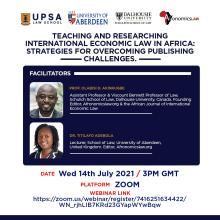Intellectual Property
Book Review: Commentaries and Analysis on Nigeria's Trade Marks Act by Mark Mordi
Call for Application: Postdoctoral Research Fellowship - DSI/NRF SARChl Research Chair: Intellectual Property, Innovation & Development at the University of Cape Town
December 17, 2021
Postdoctoral Research Fellowship – DSI/NRF SARChI Research Chair: Intellectual Property, Innovation & Development
Department of Commercial Law, University of Cape Town, South Africa
Deadline: 2022-01-14
Nigeria and WIPO’s Development Agenda
The African Society of International Law Annual Conference: Africa and International Trade Law
October 22, 2021
Africa & International Trade Law
Friday to Saturday, 29-30 October 2021
Virtual Conference
To register, click here
First Approximation for the Black Letter Law and Key Aspects of Practice in IP Enforcement Across Africa
Intellectual Property Enforcement in Africa: Are Regional IP Organisations the Way to Go?
Reflections on Day 2 of the AfIELN Biennial Conference: Covid-19 and International Economic Law: Africa’s Experiences and Responses
The Southern African Public Law Journal Launches New Blog: The Public Law Corner
August 22, 2021
In association with the Southern African Public Law Journal (SAPL), the Public Law Corner (PLC) is a contemporary space for legal practitioners, students, academics, and people beyond the legal sector to engage with relevant and current legal issues related to public law. Our main aim is to amplify all voices and issues in public law that are often excluded from formal publications.
Webinar: Teaching and Researching International Economic Law in Africa, Strategies for Overcoming Publishing Challenges
July 2, 2021
International economic law is an emerging area of teaching, research, and practice in Africa. The area, which is a sub-field of international law, is concerned with the regulation of economic relations between states as well as the conduct of private parties involved in cross-border economic and business transactions.

